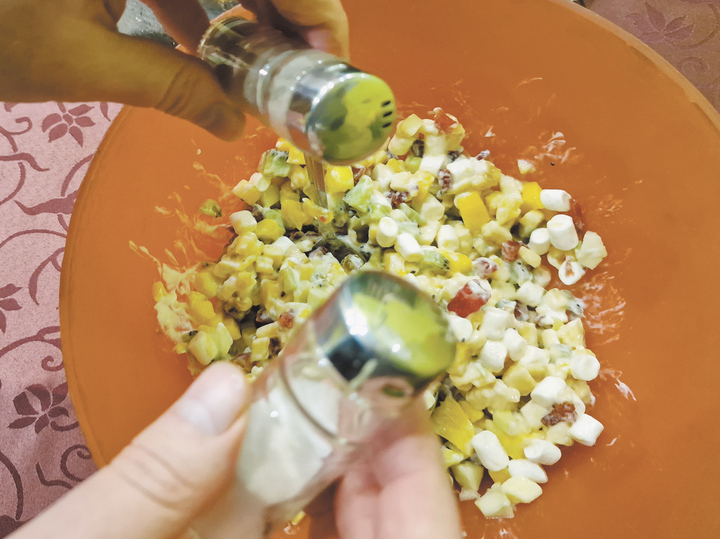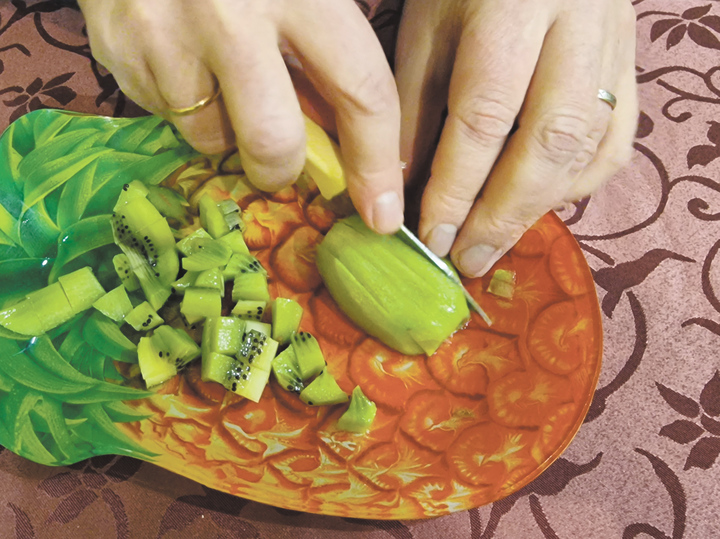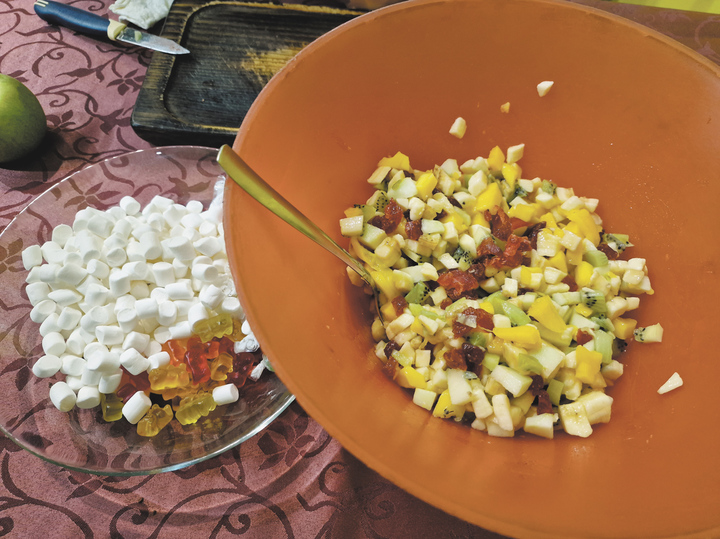Kiwi, bananas, dried strawberries: an Olivier recipe for celebrating the Year of the Dragon has been named
[ad_1]
The tradition of “delighting” the symbol of the coming year with a New Year’s feast appeared not very long ago, but has taken root well in Russia. So, for example, in the year of the Tiger there must be meat on the table (to the delight of the predator!), in the year of the Rabbit it would be good to prepare salads with carrots and more fresh herbs (and no rabbit meat, of course!), and in the year of the Rooster chicken was banned . This time it will be more difficult. Nobody knows for certain what a crocodile… sorry, dragon eats for lunch – unless you rely on scattered information from fairy tales. Or improvise and try to make the feast fabulous: to match the main character.
Well, on the New Year’s table in Russia the main character should almost always be the Olivier salad. Every year, culinary experts invent new and new versions of it – with smoked duck instead of boring doctor’s sausage, with avocado instead of potatoes, with quail and crayfish tails, as well as vegan Olivier or raw food. Let’s try one more – fabulous.
From Olivier, of course, only the name will remain here – and the external resemblance: in essence, our fantastic salad will be no more similar to the classics of Soviet canteens than a fairy-tale dragon is similar to a crocodile from a zoo. A fantastic Olivier – one that would appeal to both dragons and children – must be sweet.

Recipe for a perfect fairy tale
We will rely on external resemblance – our fantastic salad should look like Olivier salad at least in appearance. We will also try to comply with taste principles as much as possible: components that are bright in taste will be combined with neutral ones. And if the classic Olivier is prepared mainly from vegetables (potatoes, carrots, cucumbers), then fruits will predominate here.
Fruit salad as such is, of course, not new. You can prepare it however you like: either according to a strictly prescribed recipe (for example, from citrus fruits alone), or improvise by adding anything. The risk here is much less than with a regular salad – all fruits and berries go together (just some are better, some are worse).
So, bananas instead of potatoes. This solution, by the way, is not new: in the cuisine of some exotic countries, such as Ecuador or Peru, bananas are served as a side dish. In principle, it’s no wonder: some are rich in bananas, and some are rich in potatoes… For salad, it is better to take hard bananas, even greenish ones. They will hold their shape better while slicing.
Kiwi will replace pickled cucumbers – green, and the taste is quite bright, with sourness. You will need kiwis that are not too soft, preferably harder. Those that can only be eaten with a spoon are not suitable for imitating pickles (and salads in general).

Instead of eggs – airy marshmallow marshmallows: white, elastic, and the taste is quite neutral (like egg white).
While debates about sausage or chicken (or even meat, tongue, brisket… about anything!) continue to rage around the traditional Olivier, in our fantastic Olivier the main component will be dried strawberries. Dense, elastic, it will look against the background of bananas and kiwis just like meat against the background of potatoes – an obvious soloist and queen. And it’s also red – a very “meaty” color.
We will replace the bright red cubes of boiled carrots with one of the exotic fruits – mango or papaya. It would, of course, be possible to take a nectarine that is more common in our latitudes… but finding good nectarines in December is more difficult than finding good mangoes. You need very little of this ingredient – no one cooks Olivier with a predominance of carrots!
Finding a plausible replacement for green peas will be the hardest part. You could choose some small berries like red currants – but, alas, there are no green ones among them (well, red spots in the middle of the salad would ruin the concept). Therefore we will have to limit ourselves pieces of green marmalade with apple flavor.

Debate question: should I add apple to Olivier? There is no consensus here: some like it, some don’t—and some like it sweet, some like it sour. In our dessert version of the salad, the apple certainly won’t spoil anything, so let it be.
Another controversial issue is about onions. There is a lot of disagreement about the traditional recipe, but here we have crushed sour caramel can be an analogue of onion – it will add that very necessary piquancy.
Use unsweetened Greek yogurt as a dressing. – it will help balance a very bold mixture, reminiscent of the cloying powder according to the recipe of Carlson, who lives on the roof. However, if you’re in the mood, you can throw yourself headlong into the pool of creativity and prepare a sweet version of mayonnaise. This should be a liquid version of custard, reminiscent of Italian sabayon (mayonnaise is made from yolks – and this is also made from yolks!). The yolks will need to be beaten with sugar and heated in a water bath, adding a couple of tablespoons of cognac, vermouth or other aromatic alcohol. But, however, excess sugar may be unnecessary here.

Secrets of a fabulous salad
An important rule: all components must be cut into pieces of the same size. Actually, the same principle is relevant when preparing classic Olivier. The pieces should be of medium size – not too large, but not too small crumbs. When preparing a traditional Olivier salad, a proven option is to focus on the size of green peas (they don’t cut them; whatever is there will remain that way).
If the pieces are too large, then the salad will be eaten selectively, stabbing first one thing or the other on a fork – this is also an option, only this is no longer a salad. But thanks to cutting into small cubes, each component will give off a little of its smell and be saturated with the aromas of its neighbors. If you cut it too small, you’ll end up with a fruit puree (especially after the fruit has released its juice, which it will!).
Such a salad cannot be prepared for future use: kiwis and mangoes will also instantly give juice – just like the pickles they replace here – but if the pickles can be squeezed, then you shouldn’t do this with fresh kiwis. In any case, be prepared that you will have to drain the juice from the chopped fruit a couple of times before dressing the salad with yogurt, otherwise an unsightly slurry will form at the bottom of the salad bowl.
Remember that when exposed to oxygen, sliced bananas (our potato substitute) may darken, so cut them last.
MEANWHILE
There is no consensus about what dishes the Green Wooden Dragon welcomes and what it rejects on the New Year’s table. Most experts agree that the Dragon likes delicacies – it would be good to cook seafood or some gourmet fish as the main dish. Good meat is also suitable (leg of lamb, steaks, etc.), but it is better to avoid chicken – for the luxurious Dragon this meat is too modest and everyday.
You cannot cook using open fire, for example, barbecue or flambe shrimp. This will offend the Dragon: the only conqueror of fire on the festive night should be himself.
[ad_2]
Source link








